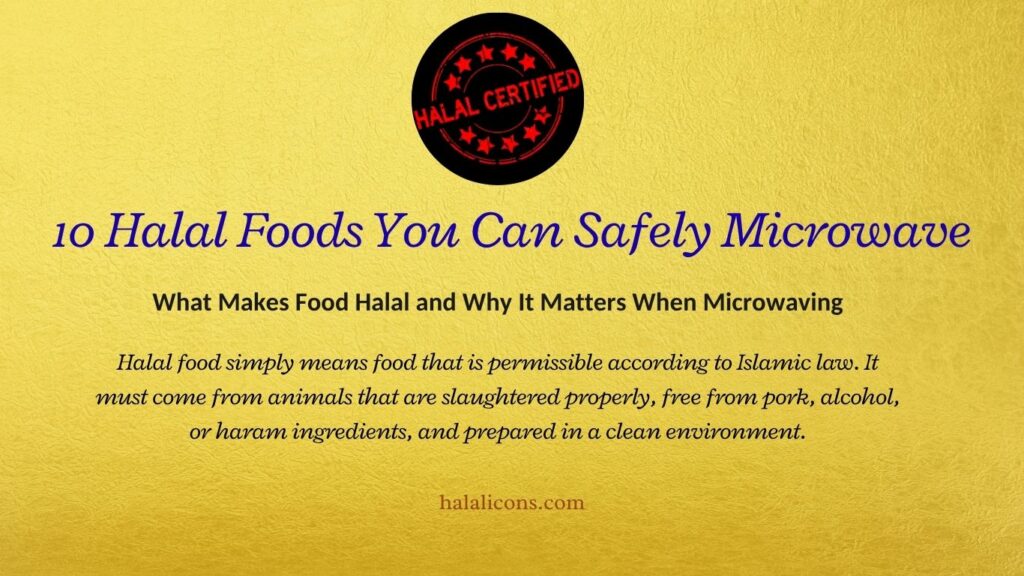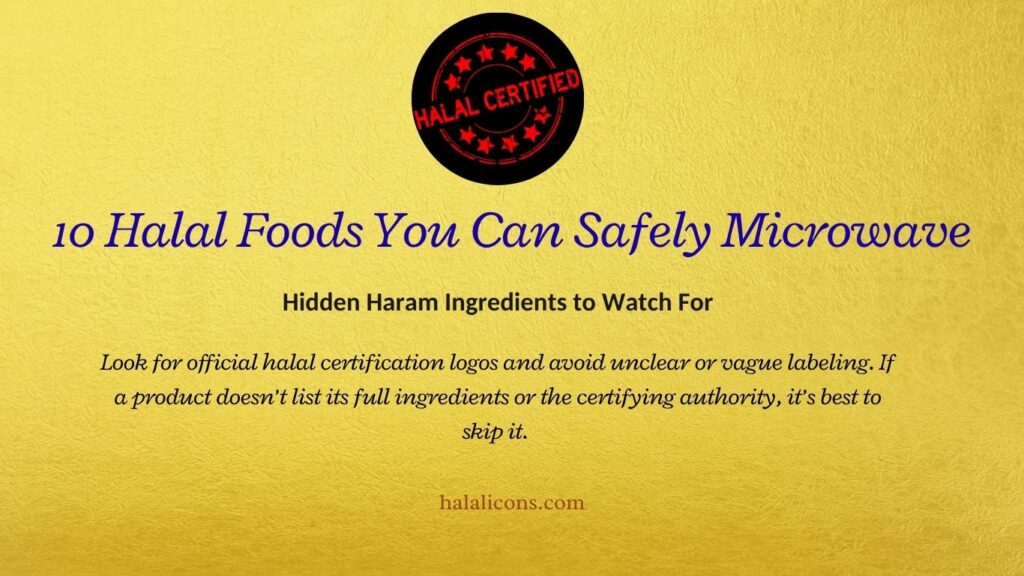Many Muslims wonder if it’s safe — and religiously acceptable — to microwave halal food. The good news is that halal foods can be safely microwaved when the right precautions are taken.
Microwaving doesn’t change the halal status of food; what matters most is cleanliness, cross-contamination prevention, and using microwave-safe containers. Whether it’s reheating halal chicken, frozen meals, or leftovers from last night’s dinner, following simple hygiene and safety steps keeps your food both halal and healthy.
In this guide, we’ll explore which halal foods you can safely microwave, how to avoid common mistakes, and how to ensure every meal remains pure and permissible.
What Makes Food Halal and Why It Matters When Microwaving

Halal food simply means food that is permissible according to Islamic law. It must come from animals that are slaughtered properly, free from pork, alcohol, or haram ingredients, and prepared in a clean environment. When microwaving, the main concern isn’t the process itself—it’s ensuring that your food doesn’t come into contact with anything non-halal.
Using separate utensils, clean containers, and a dedicated microwave space (if shared with others) helps maintain purity. Even if the food is halal-certified, cross-contamination can make it doubtful. Understanding what makes food halal helps you safely reheat or cook without compromising your beliefs or your health.
You might also like: Is Dave’s Hot Chicken Halal?
Is Microwaving Halal? The Islamic Perspective
According to Islamic scholars, microwaving food is completely permissible as long as the food itself is halal and the equipment is clean. A microwave oven is simply a heating tool—it doesn’t alter the food’s halal status.
Fatwas from reputable Islamic sources confirm that using a microwave to cook or reheat halal food is allowed, provided no contamination from non-halal foods occurs. If the microwave is shared, it’s best to wipe it clean before use and use separate covers or containers.
In essence, the microwave doesn’t make food haram—improper handling does. Proper cleanliness keeps your meals both safe and religiously compliant.
Halal Foods You Can Safely Microwave
Many halal foods are perfectly safe to microwave as long as they’re handled properly. You can easily heat halal-certified frozen meals, grilled chicken, rice dishes, curries, soups, and vegetarian options like lentils or mixed vegetables.
Seafood such as fish fillets or shrimp also reheats well when covered to retain moisture. For a quick snack, bread, naan, or chapati can be microwaved for a few seconds to stay soft and warm.
Always check packaging labels for halal certification and microwave instructions. Avoid using metal containers, and opt for microwave-safe glass or ceramic dishes to ensure your food remains both safe and halal-friendly.
Common Mistakes to Avoid When Microwaving Halal Foods
Even with halal-certified ingredients, small mistakes can make food questionable. Avoid cross-contamination by never microwaving halal food on the same plate used for non-halal meals. Make sure the microwave is clean, especially if shared with others. Don’t use plastic containers not labeled microwave-safe, as they may release harmful chemicals.
Also, avoid undercooking meats—microwaves can heat unevenly, so stir or rotate the dish halfway through. Let food rest for a minute to ensure even cooking. These small but crucial steps help preserve both food safety and halal integrity, ensuring every bite remains pure, safe, and permissible.
Best Practices for Microwaving Halal Meals Safely
To keep your meals wholesome and halal, follow these simple safety tips:
- Always use clean, halal-only utensils and containers.
- Cover food to avoid splatters and contamination.
- Choose glass or ceramic containers—avoid plastic when possible.
- Stir halfway through cooking for even heat distribution.
- Check food temperature, ensuring meat reaches at least 75°C (165°F).
- For shared microwaves, wipe the interior before use.
Practicing these steps guarantees that your meal remains hygienic, nutritious, and fully halal, giving you peace of mind and convenience every time you reheat.
Hidden Haram Ingredients to Watch For

Not all packaged “halal” foods are truly halal. When buying frozen or processed meals, always check for hidden ingredients like gelatin, rennet, lard, or alcohol-based flavorings. Some ready-to-eat meals might use non-halal emulsifiers or flavor enhancers derived from pork or animal fat.
Look for official halal certification logos and avoid unclear or vague labeling. If a product doesn’t list its full ingredients or the certifying authority, it’s best to skip it.
Staying informed about hidden haram ingredients helps protect your faith and ensures that your quick microwave meals remain 100% halal and trustworthy.
You might also like: Is redbull halal?
Tips for Shared Microwaves (Workplace or School)
If you’re using a shared microwave, especially in offices or dorms, take extra care. Wipe the interior before heating your food, as residue from non-halal meals could cause contamination. Always use a microwave-safe cover or separate container to protect your food. You can even keep a dedicated halal-safe bowl or microwave lid for personal use.
Label your container if needed and politely inform coworkers of your preference—it promotes respect and tolerance. With a little care, you can maintain halal purity even in shared spaces while showing others how easy it is to balance faith and convenience.
Final Thoughts: Keeping Your Meals Halal and Safe
Microwaving halal food is not just safe—it’s a modern, convenient, and permissible way to enjoy your meals. The key lies in maintaining cleanliness, avoiding cross-contamination, and checking for halal certification. Whether at home, school, or work, using proper containers and hygiene keeps your food both pure and delicious.
Islam emphasizes cleanliness and mindfulness in all aspects of life, including food preparation. By following these easy steps, you can confidently microwave halal foods safely without compromising your beliefs. Convenience and faith can absolutely go hand in hand—halal living made simple.
FAQs
1. Is it halal to microwave food?
Yes, microwaving food is halal as long as the food itself is halal and the microwave is clean. The process of heating doesn’t change the halal status—only cross-contamination or haram ingredients can make food impermissible.
2. What halal foods are safe to microwave?
You can safely microwave halal-certified frozen meals, rice dishes, curries, soups, bread, seafood, and vegetables. Always use microwave-safe containers and ensure your microwave is clean to maintain halal integrity.
3. Can I use a shared microwave for halal food?
Yes, you can use a shared microwave if you take precautions. Wipe it clean before use, cover your food, and use separate containers or microwave lids to prevent cross-contamination from non-halal meals.
4. What should I avoid when microwaving halal food?
Avoid using metal containers, unsafe plastics, or unclean utensils. Also, ensure your halal food doesn’t touch any non-halal residues in shared microwaves to maintain purity.
5. Does microwaving change the halal status of food?
No, microwaving doesn’t affect whether food is halal or haram. The key factors are the food’s source, cleanliness, and preparation method—not the heating process itself.
6. How can I tell if my frozen food is truly halal?
Look for certified halal logos from trusted authorities and check for hidden ingredients like gelatin, alcohol, or animal-derived additives. When in doubt, choose brands with clear halal certification.
7. Are microwave-safe plastics halal to use?
Yes, microwave-safe plastics are halal, but glass or ceramic containers are safer. Avoid plastics not labeled microwave-safe, as they may release harmful chemicals when heated.
Qamar Ul Haq is an Islamic historian and writer with a passion for uncovering the rich heritage of Muslim civilizations. Through in-depth research and storytelling, He brings to life the achievements, struggles, and contributions of the Ummah throughout history.